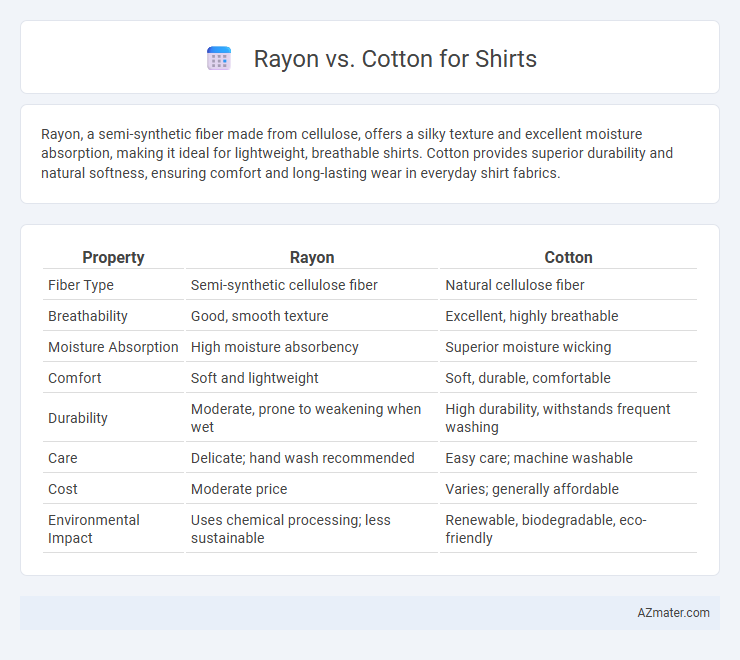Rayon, a semi-synthetic fiber made from cellulose, offers a silky texture and excellent moisture absorption, making it ideal for lightweight, breathable shirts. Cotton provides superior durability and natural softness, ensuring comfort and long-lasting wear in everyday shirt fabrics.
Table of Comparison
| Property | Rayon | Cotton |
|---|---|---|
| Fiber Type | Semi-synthetic cellulose fiber | Natural cellulose fiber |
| Breathability | Good, smooth texture | Excellent, highly breathable |
| Moisture Absorption | High moisture absorbency | Superior moisture wicking |
| Comfort | Soft and lightweight | Soft, durable, comfortable |
| Durability | Moderate, prone to weakening when wet | High durability, withstands frequent washing |
| Care | Delicate; hand wash recommended | Easy care; machine washable |
| Cost | Moderate price | Varies; generally affordable |
| Environmental Impact | Uses chemical processing; less sustainable | Renewable, biodegradable, eco-friendly |
Introduction to Rayon and Cotton Shirts
Rayon shirts, made from semi-synthetic fibers derived from cellulose, offer a smooth texture and excellent breathability, making them ideal for warm weather. Cotton shirts, crafted from natural cotton fibers, are renowned for their softness, durability, and moisture absorption properties, providing comfort and ease of care. Both fabrics present distinct advantages in shirt manufacturing, influencing style, comfort, and maintenance preferences.
Key Differences Between Rayon and Cotton
Rayon is a semi-synthetic fiber made from regenerated cellulose, offering a silky texture and excellent drape, while cotton is a natural fiber known for its breathability and durability. Rayon absorbs moisture quickly, making it ideal for humid climates, whereas cotton provides superior absorption and softness, ensuring comfort in varied conditions. The maintenance of rayon requires gentle care to avoid shrinking, unlike cotton, which is more resilient and easier to wash and dry.
Comfort and Breathability Comparison
Rayon offers a smooth, silky texture that enhances comfort by feeling soft and lightweight against the skin, making it ideal for hot climates. Cotton excels in breathability due to natural fiber structure, allowing superior air circulation that helps keep the wearer cool and dry. While rayon absorbs moisture better, cotton's superior airflow and hypoallergenic properties provide overall enhanced comfort for daily wear.
Durability: Rayon vs Cotton Shirts
Cotton shirts offer superior durability due to their tightly woven fibers, making them resistant to wear and repeated washing. Rayon, while soft and breathable, tends to weaken over time and can be prone to tearing or shrinking with frequent laundering. Choosing cotton ensures longer-lasting shirts ideal for everyday use, whereas rayon may require more delicate care to maintain its integrity.
Moisture-Wicking and Absorption
Rayon fabric offers superior moisture-wicking properties compared to cotton, making it ideal for shirts worn in hot and humid conditions. Cotton excels in absorption, efficiently soaking up sweat but drying slower than rayon, which can lead to a damp feeling during prolonged wear. Choosing between rayon and cotton depends on the balance between quick-drying moisture management and natural absorbency desired in shirt fabrics.
Maintenance and Care Requirements
Rayon shirts require gentle washing, preferably hand wash or cold machine wash, to prevent shrinking and fiber damage, and should be air-dried to maintain shape and softness. Cotton shirts are more durable and can usually withstand regular machine washing and tumble drying, though frequent high heat may cause shrinkage or fading over time. Proper care for rayon involves avoiding harsh detergents and ironing at low temperatures, while cotton is more resilient to higher heat settings and standard detergents.
Environmental Impact and Sustainability
Rayon production relies heavily on chemical-intensive processes that contribute to deforestation and water pollution, raising significant environmental concerns compared to cotton. Organic cotton offers a more sustainable alternative by using fewer pesticides and fertilizers, promoting soil health and reducing ecological footprint. However, cotton cultivation still demands substantial water resources, making sustainable sourcing and water-efficient farming practices crucial for minimizing its environmental impact.
Price Comparison: Rayon vs Cotton Shirts
Rayon shirts generally cost less than cotton shirts due to lower production expenses and the use of synthetic fibers in rayon. Cotton shirts tend to be more expensive because of the natural fiber's durability, breathability, and higher agricultural and processing costs. Consumers balancing budget and comfort often choose rayon for affordability, while cotton remains preferred for quality and long-term wear.
Best Uses and Occasions for Each Fabric
Rayon fabric offers a smooth, breathable texture ideal for dress shirts and summer events, providing a silk-like feel that enhances comfort during warm weather and formal occasions. Cotton is highly versatile, known for its durability and moisture absorption, making it perfect for everyday wear, casual outings, and office environments where comfort and breathability are priorities. Choosing between rayon and cotton depends on the event's formality and climate, as rayon suits stylish, lightweight appeal while cotton excels in practicality and all-season adaptability.
Conclusion: Choosing the Right Fabric for Your Shirt
Rayon offers a silky texture, excellent breathability, and vibrant color retention, making it ideal for stylish, lightweight shirts suitable for warm weather. Cotton provides superior durability, natural moisture absorption, and ease of care, perfect for everyday wear with a breathable, soft feel. Selecting rayon or cotton depends on your preference for comfort, maintenance, and the specific environmental conditions in which you'll wear the shirt.

Infographic: Rayon vs Cotton for Shirt
 azmater.com
azmater.com